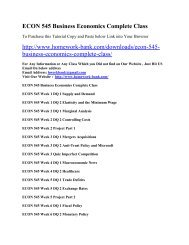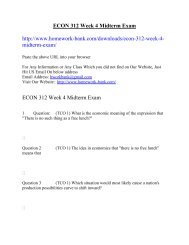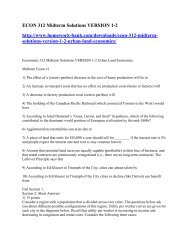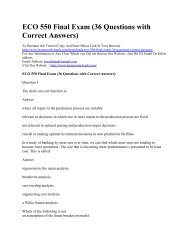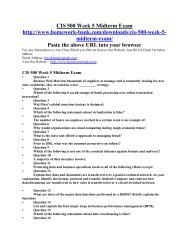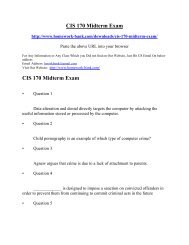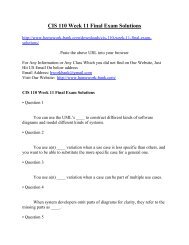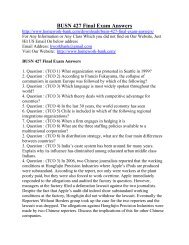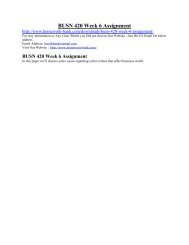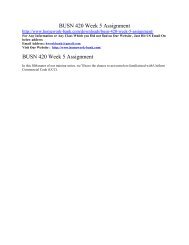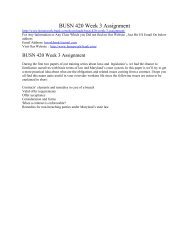BUSN 427 Global Issues in Business Complete Class Week 1
For Any Information or Any Class Which you Did not find on Our Website , Just Hit US Email On below address Email Address: hworkbank@gmail.com Visit Our Website : http://www.homework-bank.com/
For Any Information or Any Class Which you Did not find on Our Website , Just Hit US Email On below address
Email Address: hworkbank@gmail.com
Visit Our Website : http://www.homework-bank.com/
You also want an ePaper? Increase the reach of your titles
YUMPU automatically turns print PDFs into web optimized ePapers that Google loves.
3. Question : (TCO 3) India’s caste system has been around for many years. Expla<strong>in</strong> why its<br />
<strong>in</strong>fluence has dim<strong>in</strong>ished among educated urban middle class Indians.<br />
4. Question : (TCO 3) In 2006, two Ch<strong>in</strong>ese journalists reported that the work<strong>in</strong>g conditions at<br />
Hongfuj<strong>in</strong> Precision Industries where Apple’s iPods are produced were substandard. Accord<strong>in</strong>g<br />
to the report, not only were workers at the plant poorly paid, but they were also forced to work<br />
overtime. Apple immediately responded to the allegations and audited the factory <strong>in</strong> question.<br />
However, managers at the factory filed a defamation lawsuit aga<strong>in</strong>st the two journalists. Despite<br />
the fact that Apple’s audit did <strong>in</strong>deed show substandard work<strong>in</strong>g conditions at the factory,<br />
Hongfuj<strong>in</strong> did not withdraw the lawsuit. Eventually the Reporters Without Borders group took<br />
up the case for the two reporters and the lawsuit was dropped. The allegations aga<strong>in</strong>st Hongfuj<strong>in</strong><br />
Precision Industries were made by two Ch<strong>in</strong>ese reporters. Discuss the implications of this for<br />
other Ch<strong>in</strong>ese companies.<br />
5. Question : (TCO 3) Exports are largely responsible for Ch<strong>in</strong>a’s recent rapid economic growth.<br />
The country, capitaliz<strong>in</strong>g on its cheap labor force, has focused on convert<strong>in</strong>g raw materials <strong>in</strong>to<br />
products that are exported to developed countries such as the United States. In 2008, Ch<strong>in</strong>a’s<br />
trade surplus was a record $280 billion, and its hold<strong>in</strong>gs of foreign exchange reserves were over<br />
$1.95 trillion. Some critics have suggested that Ch<strong>in</strong>a is follow<strong>in</strong>g a neomercantilist policy. Are<br />
the claims that Ch<strong>in</strong>a is follow<strong>in</strong>g a neomercantilist policy valid? Why or why not?<br />
6. Question : (TCO 4) Telefonica is a Spanish telecommunications firm. For decades, Telefonica<br />
had operated as a typical state-owned enterprise, but privatization and deregulation changed that<br />
path <strong>in</strong> the 1990s. Telefonica began to aggressively pursue expansion opportunities <strong>in</strong> Lat<strong>in</strong><br />
America where it quickly became the number one or two player <strong>in</strong> nearly every country. Later,<br />
Telefonica turned its sights on Europe where its acquisitions helped transform the company <strong>in</strong>to<br />
the second biggest mobile phone operator <strong>in</strong> the world. What changes <strong>in</strong> political and economic<br />
environment allowed Telefoncia to start expand<strong>in</strong>g globally? Why did Telefonica <strong>in</strong>itially focus<br />
on Lat<strong>in</strong> America? Why was it slower to expand <strong>in</strong> Europe even though Spa<strong>in</strong> is a member of the<br />
European Union?<br />
7. Question : (TCO 7) Why did the world shift from a gold standard to fixed exchange rates?<br />
1. Question : (TCO 5) Concern<strong>in</strong>g European Union’s progress toward creat<strong>in</strong>g a s<strong>in</strong>gle f<strong>in</strong>ancial<br />
market, the quest started <strong>in</strong> 1999 was to have been completed by 2005, however, progress has<br />
been slowed by various factors related to the tradition of each member country operat<strong>in</strong>g<br />
autonomously. By 2007, significant progress had been made. Some 41 measures designed to<br />
create a s<strong>in</strong>gle market were <strong>in</strong> place and others were <strong>in</strong> the pipel<strong>in</strong>e. The current issue fac<strong>in</strong>g the<br />
EU revolves around the enforcement of the rules that have been established as law. Some experts<br />
believe that it will be at least another decade before the benefits of the new rules become<br />
apparent. Discussion of this feature can beg<strong>in</strong> with the follow<strong>in</strong>g questions. What are the benefits<br />
of creat<strong>in</strong>g a s<strong>in</strong>gle f<strong>in</strong>ancial market <strong>in</strong> the European Union for companies? Does it make sense<br />
for consumers?<br />
2. Question : (TCO 6) In the 1980s, Caterpillar was negatively affected by a strong dollar and<br />
lost significant market share to Japanese competitor Komatsu. The situation prompted Caterpillar<br />
to revise its global strategy and by the 2000s, the company was <strong>in</strong> a much better position to deal<br />
with volatile currency values. More recently, a strong dollar has actually helped boost<br />
Caterpillar’s bottom l<strong>in</strong>e. In the 1980s, a stronger dollar hurt Caterpillar’s competitive position,<br />
but <strong>in</strong> 2008 a stronger dollar did not seem to have the same effect. What had changed?<br />
3. Question : (TCO 7) In May 2001, the IMF agreed to lend $8 billion to Turkey to help stabilize<br />
its economy and halt a sharp slide <strong>in</strong> the value of its currency. Although <strong>in</strong>itially the Turkish



